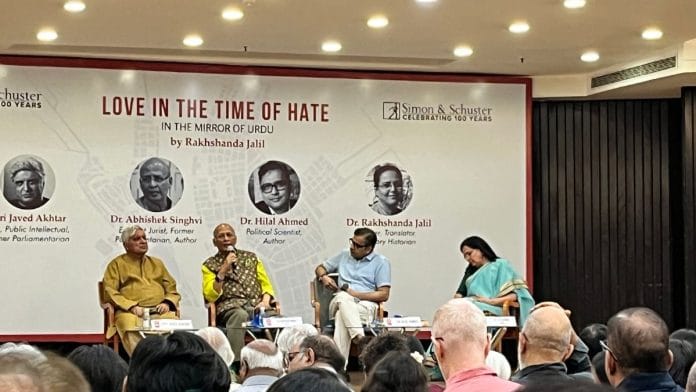New Delhi: The launch of Rakhshanda Jalil’s Love in the Time of Hate: In the Mirror of Urdu was a celebration of Urdu poetry, a conversation on identity politics, and the exploration of benign prejudice.
The essay collection explores the power of Urdu shahyaris, nazms, ghazals, and other verse forms, explaining how they inform politics, people, passions, and places. It also tracks the changes in what Jalil calls “the New India that is Bharat”. The launch event at New Delhi’s India International Centre last month discussed much more than just the beauty of poetry.
“Benign prejudice gives you your identity,” said lyricist Javed Akhtar, setting the tone for the evening. His words resonated with an audience eager to discuss the clash between identity and intolerance.
Akhtar used the example of ‘ghar ka khana’ (home-cooked food) to show how prejudice against a neighbour’s food can be part of a person’s identity. This sort of prejudice is not malevolent.
“You know that these things are there and these benign prejudices give you [an] identity, but it should not become malignant,” he said. It serves as a reminder that while bias may shape an individual’s personality, it should never consume them.
Identity and religion
Jalil’s book became a springboard for broader discussions on identity—personal, national, and religious. It was her memory of India as a child that shaped Love in the Time of Hate. She was born in 1963, a year before Jawaharlal Nehru died.
“The India I grew up in had vestiges of Nehruvian idealism,” said Jalil. It was a time when Nehru’s dramatic proclamation that dams, scientific institutes, power plants, and steel factories were the “temples of modern India” was still part of the collective public memory.
Jalil grew up in a Muslim household. “My parents prayed. Nobody asked us to. But religion was not such a thing in our home. And I see a lot of people have acquired, in some cases overnight, a religious identity,” she added.
The conversation then moved on to secularism and its steady erosion in recent times. Congress leader Abhishek Singhvi, who was among the speakers, argued that secularism is the “biggest self-preservation ethic” on the most diverse spot on earth, India.
But no nation can be called diverse or secular unless these values are embedded in its DNA—at a philosophical, constitutional, and conceptual level.
“And that was really the intent of our framers [of the Constitution],” Singhvi said, blaming politics for the erosion of these values.
“You have to reckon with the fact that over the last 75 years, a lot of the parties, all parties, I would say, have debased and devalued this concept. The more you debase it, devalue it, the more you exploit it, the more you abuse it,” he added.
Also read: Space for political documentary films is shrinking. No university spaces, a crisis point
Different ideas of India
In the introduction of her book, Jalil writes about a “crushing fear” and an almost persistent depression. According to her, this relentless feeling exists among many Muslims in urban India.
“I hear it in their silences. I sense it in their steadfast refusal to get drawn into political debates,” she writes. Jalil notices the feeling even in Muslims’s “stoicism in the face of virulent hate swirling about” in schools, colleges, and RWA WhatsApp groups.
Such widespread experiences shape the identity of India itself. Singhvi articulated this in the form of two questions: What is the idea of India that is popular today? And what is the conceptual or theoretical one?
“Different segments in India must necessarily have different ideas of India,” Singhvi said. He chose the one reflected in the spirit of the Constitution. “Because that is the only permanent Bible and Gita and book we have which is supposed to last centuries. So that idea of India you need to aspire to.”
Akhtar, on the other hand, viewed such broad questions with suspicion.
“India, naturally, is a river. It is flowing. It is going from one wave to another and moving ahead through the centuries,” he said. “Trust India. If India is the water, it will find its own level, don’t worry.”
(Edited by Prasanna Bachchhav)







Nehru family was and is an elitist. They all lived in a fantasy world at best or a feudal world at the wosrt
Nehru’s ideals of denouncing religious places of worship for dams and institutions apply to Hindus only as far as these hypocritical leftists are concerned. In the case of Muslims, there is an increase in numbers and more mosques for taking over India and turning the Hindus into a minority.
Rubbish report.